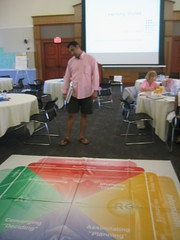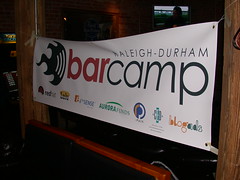I’m pretty certain there’s no way in hell that the actual game can compare to these brilliant commercials:
“Then one day she meets a John Holmes motherfucker…”
I’m pretty certain there’s no way in hell that the actual game can compare to these brilliant commercials:
“Then one day she meets a John Holmes motherfucker…”
If anyone reading this blog would do me a huge favor and throw a linkback or comment or mention on your blog my way…we’re trying desperately to find a great candidate for our recently vacated Head of Systems position here at UTC. The entire job ad is here, and here’s a brief description. If anyone has specific questions, I’ll try and answer them within the best of my legal ability (the state of TN has some wacky rules about job ads)….
Reporting to the Dean of the Lupton Library, this position provides leadership and know-how to advance the Library through the development and expansion of library collections, tools and services that facilitate learning, teaching, and scholarship within a digital environment, as well as creating an infrastructure that facilitates the adoption of next generation library services.
Specific information technology related responsibilities include, but are not limited to:
- Provides library leadership and strategic planning for the design, integration, and maintenance of the library-computing environment and for the specification, acquisition, development, and support of digital library collections, tools, services, and support applications that facilitate teaching, learning, and research.
- Manages a staff of 2 professionals who develop, deliver, and maintain information technology services for the Lupton Library and works collaboratively with other librarians and colleagues throughout the Library and the University.
- Administers the Library’s VTLS Virtua integrated library system.
- Provides consultation, support and problem resolution to ensure Library software and hardware is functional, interoperable, and serves the ongoing goal of supporting research and teaching.
- Gathers, monitors, and evaluates usage statistics.
- Serves as backup to other members of the Library’s Information Technology Services Department.
- Ensures the Library’s Information Technology Services Department is positioned to take advantage of new developments that improve the patron experience and staff productivity.
- Serves as primary Library liaison to University’s Information Technology Division.
This is a great environment to work in…the team that is in the library now is remarkable. We’re moving towards a very robust systems/IT infrastructure, and have some really great ideas where we’d like to go. Plus, you’d get to work with me! 🙂
So if anyone knows someone looking, please make sure they apply! As well, throw a link to this entry up anywhere you can, or link directly to the job ad above.
Really funny stuff from Dave Pattern: the Library 2.0 Idea Generator!
 A great deal of today was spent trying to wrap our heads around Kolb’s Learning Styles inventory, developing lessons that incorporated as many of the styles as possible, and examining our own preferences in instructional design with Kolb as a lense. Rewarding, but difficult stuff to work through.
A great deal of today was spent trying to wrap our heads around Kolb’s Learning Styles inventory, developing lessons that incorporated as many of the styles as possible, and examining our own preferences in instructional design with Kolb as a lense. Rewarding, but difficult stuff to work through.
We also had the pleasure of having Randy discuss our primary instructional tool: ourselves. We looked at voice, body, and attitude as it relates to the instructional arena. Again, incredibly rewarding stuff, and things that definitely aren’t taught during the MLS. I’m learning about 2-3 things every day that will directly influence my instruction at UTC…which, I suppose, is the point, after all.
Tonight = mock instruction, with the real thing tomorrow.
The day before we began Immersion, I was able to do a tour of Boston that had been arrange by ACRL. We saw a ton of Boston, including the Old North Church and Boston Commons. We also drove over the Salem and saw the House of Seven Gables and the cemetary where the Salem Witches are buried…the picture is of the memorial to these innocents who were killed by a fanatical populace.
My Immersion photos are here, and more photos are being added by other participants using the acrlimmersion2006 tag.
Today was day one of Immersion, and there’s far more than I can possible write. Plus, I should be doing my homework. So I’m off to that. More Immersion talk tomorrow.
This morning I head out for ACRL Immersion, at Simmons College in Boston, MA. The next week will be a whirlwind of instruction, along with trying to keep up with the ongoing website redesign and, you know, breathe.
I’m going to do what I can to blog some of the action. The schedule is absolutely insane…7:30 am – 9 or 10pm every night. So what time I have may be reserved for sleeping, but I’ll do my best. 🙂

Yet another reason that I miss the Triangle…incredibly fun things like BarCampRDU. It looks like Fred and Paul and the gang did an incredible job with this, and I’m sad to have missed it. Next year, guys?
Oh, and do you have any of those rockin’ tshirts left over in XL? 🙂
Holy Crap! Thanks to Patrick for pointing out to me that Wired is featuring a story about the Hacker’s On Planet Earth (HOPE) Conference, which was evidently co-organized by Greg Newby.
Conference co-organizer Greg Newby, a computer science professor at the University of Alaska, said the conference reflected “the hacker spirit, which is about exploration and questioning.” He added, “This involves political awakening, as well as open sharing of information.”
So why do I care? Little did I fully appreciate at the time, but Dr. Newby was my professor for my Information Security class at UNC. Turns out I was learning from one of the best…it was an amazing class. One of the things that stuck with me was that at the beginning of the semester, he told us that he had set up a server in his office for us to crack…and that we should just go to it. Every day we learned a bit more about intrusion, and then used those exploits on our target. It was a phenomenal way to learn about security and network issues in a very practical manner.
So the Chronicle has an article in this week’s issue regarding the possible changes coming down the pike for scholarly communication in the digital age, and what form that might take.
To say they are a little late to the party is a bit of an understatement.
Welcome to what is either an expansive new future for the book in the digital age, or a cacophonous morass that will turn scholarship into a series of flame wars — or both.
Scholars like Mr. Wark, who are as comfortable firing off comments on blogs as they are pontificating at academic conferences, are beginning to question whether the printed book is the best format for advancing scholarship and communicating big ideas.
In tenure and promotion, of course, the book is still king — the whole academic enterprise often revolves around it. But several scholars are using digital means to challenge the current model of academic publishing.
Thanks to the Internet, they argue, the book should be dynamic rather than fixed — not just a text, but a site of conversation. Printouts could still be made and bound, but the real action would be online, and the commentary would form a new kind of peer review.
Even some publishers are experimenting, though so far the most ambitious efforts have been at scholarly journals. Nature, for instance, started a program this summer in which authors can opt to have articles they submit made available immediately as electronic pre-prints that anyone can comment on. Those papers are still reviewed the old-fashioned way, but the comments by online users are also taken into consideration.
Many academic publishers shrug off open-review e-books as simply the latest technological fad, saying that the time-tested peer-review process should not be replaced by bands of volunteers.
Whether traditional publishers join in or not, there is no doubt that academic discourse is increasingly occurring on blogs and other online forums. So how can that energy be channeled into accepted forms of scholarship? Is it time for the book to get a high-tech makeover?
We in the blogosphere have been doing this sort of thing for some time…Wark’s experiment with this is amazing, but he’s hardly the first to open up a scholarly paper to online critique. And the Chronicle is woefully behind the times in talking about it now…the first blog entry from here that I could find on the subject dates back to April of 2004.
But it’s timely that this is published now. I just realized last week that as much as I have said about blogs and other online contributions counting for tenure and other academic advancement, I hadn’t listed this very blog on my CV. Talk about an oversight! So I added it, and in my most recent quarterly report to my Dean, I added statistics for the blog as well. Any discussion about this subject is welcome, dear readers…I especially would love to know if other library bloggers list their blog on their CV or in reports to those higher up.
But my point of view on this subject is pretty clear: Scholarly Publication, as it has been known, is dead. It just doesn’t know it yet. The new digital models of open communication that allow for commentary while maintaining clear versioning of documents, combined with the Open Access movement and the nearly-costless ease of online publication will become the dominant scholarly communication method in the next 20 years.
How could I have possibly not known that Wikipedia has a Reference desk?